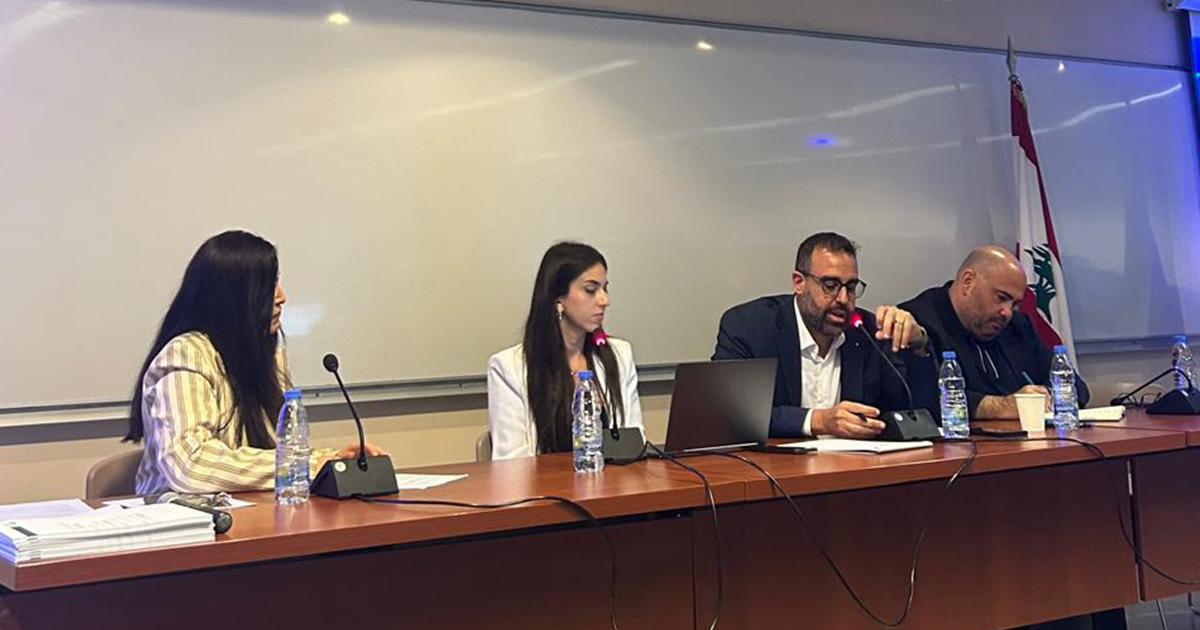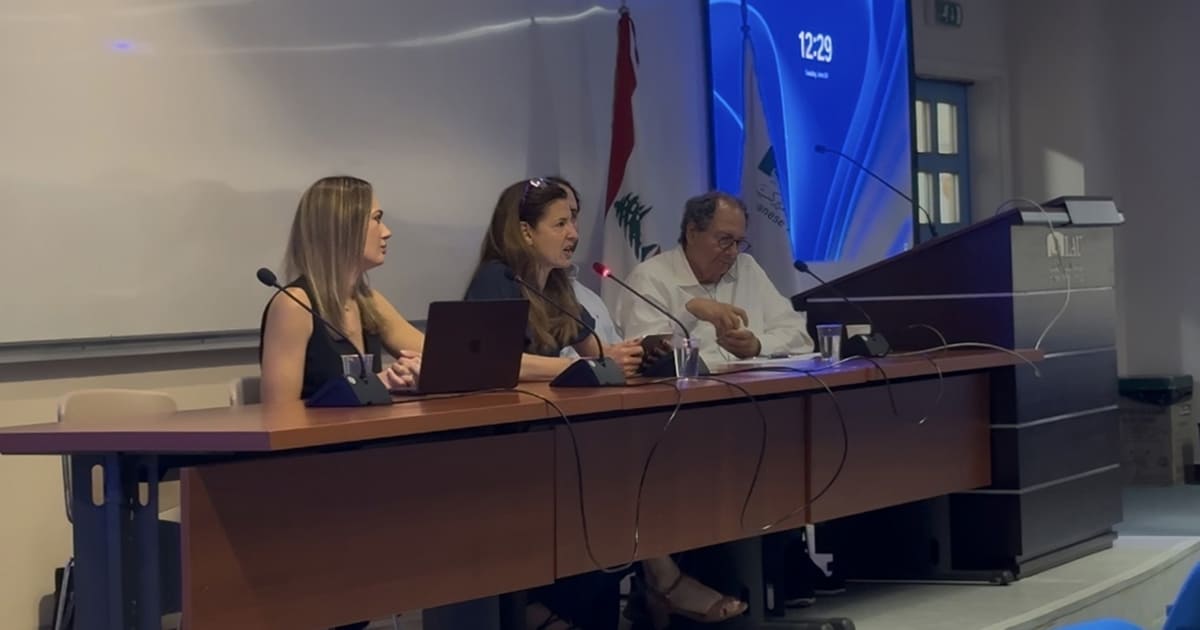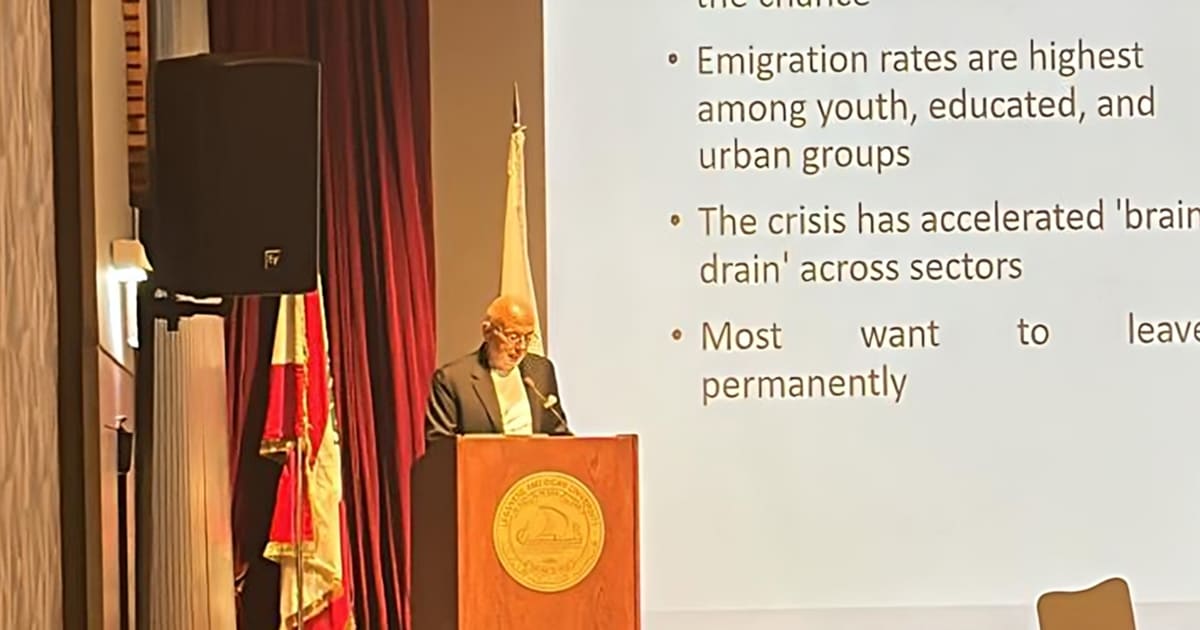Scholars and Policymakers Reimagine Lebanon’s Future
LAU’s two-day conference facilitates actionable dialogue and emphasizes the role of academia in shaping reform.
Against the backdrop of Lebanon’s political and economic crises, the Institute for Migration Studies (IMS) and the Institute for Social Justice and Conflict Resolution (ISJCR) at LAU’s School of Arts and Sciences held a two-day conference on June 23 and 24 focused on sustainable solutions to critical issues of displacement, governance and reform.
Titled Seizing Lebanon’s Moment: From Crisis to Renewal, the event on the LAU Beirut campus brought together scholars, policymakers and civil society representatives for meaningful dialogue to help generate actionable insights and foster collaborative approaches to the country’s recovery.
“Our aim through holding this conference is to leverage theoretical analysis to engage directly with policy action,” said IMS Director Jasmin Lilian Diab, noting that the country’s continuous combat with institutional collapse and a considerably high refugee-to-population ratio is a matter of increasing importance.
The conference—made possible by a generous grant from the Carnegie Corporation of New York in support of resilience and inclusive governance in the Middle East—featured six sessions on the intersections of humanitarian response, economic reform and post-conflict recovery, which are “often treated in isolation but, in reality, are deeply interconnected,” added Dr. Diab.
Among the topics tackled by panelists on the first day were the long-term implications of Syria’s displacement crisis on Lebanon, particularly in terms of political tensions and regional stability.
The event opened with the launch of The Politics of Crisis-Making: Forced Displacement and Cultures of Assistance in Lebanon, a book by Associate Professor of Humanitarian Studies at University College London Estella Carpi. The special session, chaired by Title IX Director Jennifer Skulte-Ouaiss and including IMS fellows and faculty, examined how forced displacement in Lebanon is shaped by the political framing of crises and the unequal, often sectarian, distribution of humanitarian aid.
Other conversations, featuring former ISJCR Director and current Associate Professor of International Politics and Conflict at The Fletcher School of Law and Diplomacy Tamirace Fakhoury, addressed the geopolitical possibilities for reconstruction and reevaluated humanitarian systems in the region, along with Dr. Diab, LAU alumna and IMS Senior Research Fellow Yasmine Fakhry (MA ’22), and renowned experts in the field.
The discussions throughout the day also analyzed the complex issue of safe and voluntary returns to Syria, questioning their likelihood under the current political and security conditions in the region. The speakers raised concerns about the risks of premature return initiatives, particularly in the absence of safety protections and touched on the broader implications of such returns on Lebanon’s road to recovery.
These conversations centered around stabilizing the financial system, improving transparency—even accountability—in governance, and implementing policies that would restore public trust in the state itself. Each panelist, among whom are Assistant Dean of Graduate Studies and Research Walid Marrouch and Assistant to the President for Public Policy Leila Dagher, made sure to note that these insights are prerequisites both for economic revival as well as for laying the groundwork for sustainable and inclusive growth in the upcoming years.
A highlight of the conference was a fireside chat with His Excellency the Minister of Economy Amer Bisat, moderated by ISJCR Director Fadi Nicholas Nassar, whose positive outlook on Lebanon’s future resonated with attendees, including LAU President Chaouki T. Abdallah, government officials, researchers, practitioners and faculty.
Clarence Dillon Professor of International Affairs and Director of Weatherhead Center for International Affairs at Harvard University Melani Cammett set the stage for the session by delivering a keynote address that tackled the challenges and opportunities facing Lebanon’s road to recovery and transformation.
The session concentrated on a candid and strategic approach to recovery, stressing the need for a clear vision that makes use of the country’s labor force and educational institutions against its economic collapse and political stagnation.
The focus shifted on the second day to civil society, advocacy and restoring public trust in institutions. The international panelists, along with LAU’s own, dissected the role of grassroots movements and human rights defenders in driving social and political change through reforms aimed at enhancing transparency, accountability and institutional integrity.
By creating spaces for thoughtful, interdisciplinary dialogue, Lebanon’s challenges can openly be faced in hopes of finding practical ways forward, suggested Dr. Nassar. Ensuring an alignment between research priorities and societal needs highlights the university’s role as a public good in providing a space where pressing issues can be examined with depth and nuance.
This underscores LAU’s role as an innovative educational institution driven by a passion for academic discourse that can hold space for vital, evidence-based research.
At a time when Lebanon faces existential questions about its future, it becomes the institution’s top priority to encourage solution-oriented discussions and civic engagement. In doing so, such events can provide a template for how academic rigor can engage with societal crises when needed most.
The full program, including the complete list of speakers, can be accessed here.


